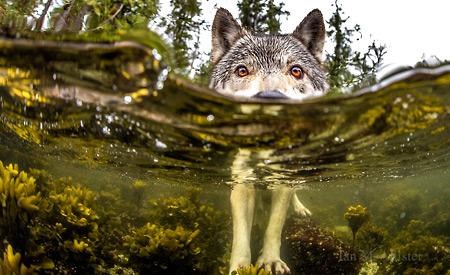Ian McAllister is co-author of one of the most influential Canadian books ever. Published in 1997, The Great Bear Rainforest: Canada’s Forgotten Coast, brought about protective legislation to conserve the northern half of BC’s west coast.
McAllister’s most recent, Great Bear Wild: Dispatches from a Northern Rainforest, emphasizes the importance of wilderness conservation in one of the Earth’s richest wildlife habitats.
“This book explores the different worlds of the Great Bear and incorporates more of the underwater component,” said McAllister in a telephone interview with the Peak. “We really have one of the greatest wild coastlines on the planet.”
And its splendor is being recognized internationally with more people putting the Great Bear Rainforest of their lists of places to see in their lives, he said.
Great Bear Wild maps, with the help of McAllister’s images and narrative, the author’s journey through the Great Bear Rainforest over the past 25 years—a collection of his exploring, researching and campaigning for the rainforest’s river valleys, headwaters and hidden offshore depths. This book provides a glimpse into the forest’s rich biodiversity, one of the wildest places left on the planet, home to the country’s largest grizzly and kermode “white spirit” bears.
“Everyone is just absolutely mesmerized and shocked with how incredibly spectacular our coast is,” said McAllister. “It’s a really special place with a lot of globally unique and rare species.”
McAllister said that part of the story the book tells is that of the coast’s resurgence of life from “the dark days of industrial whaling, the fur trade, unsustainable fisheries and just a lot of poor management and decisions.”
Since those days, the wildlife photographer said that there are now more humpback whales on the coast than there have been for decades, fin whales are returning and even northern pacific right whales were observed twice last year, the first time in 40 years that they have been spotted off the coast. He added that there have been an increase in species like Pacific white-sided dolphins, sea lions and sea otters among others.
“Ocean productivity is showing signs of abundance,” he said. “It’s a really exciting time because we’re trying to figure out why this is occurring and where this is going.”
McAllister grew up in Victoria. His photographs have been published in numerous publications including International Wildlife, BBC Wildlife, Audubon, Sierra and Beautiful British Columbia.
“A full suite of flora and fauna still exist here and we’re getting glimpses of what this coast used to be like in terms of the herring returning and a long list of species showing recovery.”
He and his partner Karen spent the better part on the 1990s exploring and charting, by boat, the ecosystems of 2,000 kilometres of unprotected coast from Knight Inlet, near the opening of Johnstone Strait (east of Port McNeill and Malcolm Island), north to the tip of the Alaskan panhandle. The couple did this as part of their work to raise awareness about the impacts of logging in the Great Bear Rainforest for Raincoast Conservation Society, an organization they helped co-found with Ian’s father and others in 1990.
Their work has helped raise the profile of the area and in 2006 the BC government introduced some protection measures and $30 million if the federal government matched it, which happened in 2007 along with a pledge to preserve 1.2 million hectares of the Great Bear. Another $60 million has also been raised by private organizations and philanthropic groups. The McAllisters live on Denny Island in the Great Bear Sea where they run their environmental awareness organization, Pacific Wild.
Time magazine named Ian and Karen “Environmental Leaders for the 21st Century,” and gave high praise for the book which has brought the rainforest to the front of the public imagination.
“It’s an exciting time, but we are dealing with some of the most significant threats to the coast,” he said. “While we’re celebrating what we have here, we are also living in fear of what is being planned for it.”
McAllister said a key element of his work is educating the public about what is at stake and hoping that people will be inspired to take action.
“This is a response to the huge gap in the decision making process that has brought us to the point where the federal government has approved the Northern Gateway Pipeline project and all these LNG [liquefied natural gas] proposals are on the books for the North Coast.”
He thinks too much focus is being put on how technology will mitigate oil spills and solve problems. “No one is discussing what is potentially at stake here in terms of what we would be committing this coast to in the way of oil spills, acoustic disturbance, pollution and impacts on First Nations people,” McAllister said.
Over the past 25 years he said that it has become increasingly clear that he is going to need “a few more lifetimes” to fully explore and research the coast.
“There’s so many mysteries left to uncover,” he said, “so many unknown and profound things left to discover.”
McAllister will be at Max Cameron Theatre as part of his BC book tour at 7 pm on Friday, November 21. Tickets are available at Breakwater Books and Coffee and at the door. Tickets are $10 for adults and $5 for children and seniors.



